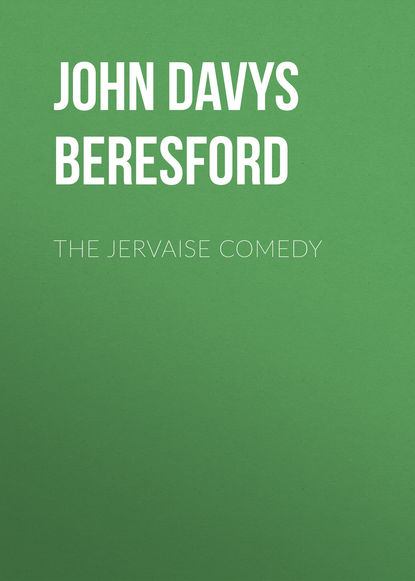По всем вопросам обращайтесь на: info@litportal.ru
(©) 2003-2024.
✖
The Jervaise Comedy
Автор
Год написания книги
2018
Настройки чтения
Размер шрифта
Высота строк
Поля
“Don’t they know anything about this? Anything, I mean, before last night’s affair?”
“Practically nothing at all,” Banks said. “Of course, nothing whatever about last night.”
“And you honestly think…” began Jervaise.
“That’ll be all right, won’t it, Anne?” Banks replied.
But Anne, still leaning back in the corner of the settle, refused to answer.
Jervaise turned and looked down at her. “If you all went…?” he said, giving his incomplete sentence the sound of a question.
“Oh! I should certainly go, too,” she replied.
Jervaise frowned moodily. I could see that he was caught in an awkward dilemma, but I was not absolutely sure as to the form it took. Had Anne made conditions? Her remark seemed, I thought, to hint a particular stipulation. Had she tried to coerce him with the threat of accompanying her brother to Canada unless the engagement to Brenda was openly sanctioned by the family?
“But you must see how impossible it is,” Jervaise said, still looking at Anne.
“We don’t think so,” Brenda put in.
“You don’t understand,” her brother returned savagely.
“You don’t,” Brenda replied.
Jervaise snorted impatiently, but he had enough control of himself to avoid the snare of being drawn into a bickering match.
“It isn’t as if the decision rested with me,” he went on, looking down at the hearth-rug, but still, I fancy, addressing himself almost exclusively to Anne. “I can’t make my father and mother see things as you do. No one could. Why can’t you compromise?”
“Oh! How?” Brenda broke out with a fierce contempt.
“Agree to separate—for a time,” Jervaise said. “Let Banks go to Canada and start a farm or something, and afterwards you could join him without any open scandal.”
“Any mortal thing to save a scandal, of course,” Brenda commented scornfully.
“Would you be prepared to do that?” Jervaise asked, turning to Banks.
I thought Banks seemed a trifle irresolute, as though the bribe of finally possessing Brenda was tempting enough to outweigh any other consideration. But he looked at her before replying, and her contemptuous shake of the head was completely decisive. He could not question any determination of hers.
“No, I wouldn’t,” he said.
“But look here, Brenda, why…” Jervaise began on a note of desperate reasonableness.
“Because I’m going out with him,” Brenda said. They might have chased that argument round for half an hour if Ronnie had not once more interposed.
His dudgeon had been slowly giving place to a shocked surprise. It was being borne in upon his reluctant mind that Brenda and Banks honestly intended to get married. And here was Frank Jervaise, for some mistaken purpose of his own, calmly admitting the possibility of the outrage, instead of scorning the bare idea of it with violence.
“I think you’re making a ghastly mistake, Frank,” he said with a composure that was intended to be extremely ominous.
Jervaise clutched at the interruption, probably to give himself a little more time. The women were proving so unamenable to his excellent reasoning. One simply contradicted him, and the other refused to speak. “What’s a mistake, Ronnie?” he asked.
“Listening to them at all,” Turnbull said, with a preposterous attempt to be dignified. He would not look at Brenda as he continued, but he was certainly aware that she had turned towards him when he spoke, and the consciousness that she was watching him steadily increased his embarrassment. “It’s perfectly absurd, I mean, to talk as if you and your people would allow the thing to go on—under any circumstances—perfect rot! Why can’t you say at once that it’s got to stop—absolutely, and—Good Lord!—I don’t care what any one thinks—if I were in your place I’d jolly well sling Banks off the premises—I tell you I would—” he got to his feet, his vehemence was increasing, as if he would shout down Brenda’s silent disdain—“I’d confoundedly well kick him out of the county…” He looked almost equal to the task as he stood there roaring like a young bull-calf; but although he could have given his rival a good three stone in weight there was, I fancy, a difference in the quality of their muscles that might have left the final advantage with Banks in a rough-and-tumble engagement.
But despite, or perhaps on account of his complete ineptitude, I had a feeling of sympathy for Turnbull. It must have been very exasperating for him to stand there, roaring out his sincerest convictions and to be received by every one of us with a forbearing contempt.
Even Brenda expressed something of pity for him.
“My dear Ronnie, don’t be absolutely idiotic,” she said, forbearingly, but rather as though she warned him that he had said quite enough.
He breathed heavily, resentfully, but still declined to look at her. “Of course if you’d sooner I went away altogether…” he remarked.
“I don’t see that you can help us by staying,” Brenda said.
“I mean for good,” he explained tragically.
I heard afterwards that he had been in love with Brenda since she was nine years old, but I might have inferred the fact from his present attitude. He simply could not believe, as yet, that she would let him go—for good, as he said. No doubt she had tricked and plagued him so often in the past that the present situation seemed to him nothing more than the repetition of a familiar experience.
Brenda must have realised that, too; but, no doubt, she shrank from wounding him mortally in public. The ten years of familiar intercourse between her and Ronnie were not to be obliterated in a day, not even by the fury of her passion for Arthur Banks.
“I know,” she said. “But you are interrupting, Ronnie. Do go!”
“And leave you here?” He was suddenly encouraged again by her tone. He looked down at her, now; pleading like a great puppy, beseeching her to put a stop to this very painful game.
“Surely, Ronnie, you must realise that I—mean it, this time,” she said.
“Not that you’re going to … going to Canada,” he begged.
“Yes. Yes. Definitely and absolutely finally yes,” she said.
“With—him?”
“Yes.”
“But, Brenda!” The long-drawn appeal of her name showed that the full bitterness of the truth was coming home to him at last.
“I’m sorry,” she said, and the sound of it was in some way painfully final.
“It isn’t because…” he began, but she anticipated his well-known reasons by saying,—
“It’s nothing to do with you or with anything you’ve done, nothing whatever. I’m sorry, Ronnie, but it’s fate—just fate. Do go, now. I’ll see you again before—before we go.”
And still he stood for an instant undecided; and I could see the struggle that was going on in him, between the influence of Harrow and Oxford and those of the honest, simple primitive man. He knew that the right, conventional thing for him to do was to be magnanimous; to admit that he was the defeated lover, and to say something that would prove how splendid he could be in the moment of disaster. The traditions of Harrow, Oxford, and the melodrama united to give him an indication of the proper conduct of the situation, and against them was ranged nothing more than one feral impulse to take Banks by the throat and settle his blasphemous assumption of rivalry off-hand.
But it was, I think, a third influence that decided the struggle for that time. His glare of wrath at Banks had been followed by one last yearning look at Brenda, and some sentimental realisation of his loss rose and choked him, temporarily superseding the powers both of make-believe and instinct. One lesson he had learnt at Harrow and Oxford so thoroughly that he re-acted to it even in this supreme crisis of his life. He might give expression to brutal passion, but in no circumstances whatever must he break down and weep in public.
He turned quickly and blundered out of the room with a stumbling eagerness to be alone that was extraordinarily pathetic.
“You’ll admit, B., that it’s cursedly hard lines on Ronnie after all these years,” Frank said with what sounded like genuine emotion.
She took that up at once. “I know it is,” she said. “It’s going to be hard lines on lots of people, but there’s no way out of it. You may think it’s silly tosh to talk about Fate; but it is Fate.”
“Practically nothing at all,” Banks said. “Of course, nothing whatever about last night.”
“And you honestly think…” began Jervaise.
“That’ll be all right, won’t it, Anne?” Banks replied.
But Anne, still leaning back in the corner of the settle, refused to answer.
Jervaise turned and looked down at her. “If you all went…?” he said, giving his incomplete sentence the sound of a question.
“Oh! I should certainly go, too,” she replied.
Jervaise frowned moodily. I could see that he was caught in an awkward dilemma, but I was not absolutely sure as to the form it took. Had Anne made conditions? Her remark seemed, I thought, to hint a particular stipulation. Had she tried to coerce him with the threat of accompanying her brother to Canada unless the engagement to Brenda was openly sanctioned by the family?
“But you must see how impossible it is,” Jervaise said, still looking at Anne.
“We don’t think so,” Brenda put in.
“You don’t understand,” her brother returned savagely.
“You don’t,” Brenda replied.
Jervaise snorted impatiently, but he had enough control of himself to avoid the snare of being drawn into a bickering match.
“It isn’t as if the decision rested with me,” he went on, looking down at the hearth-rug, but still, I fancy, addressing himself almost exclusively to Anne. “I can’t make my father and mother see things as you do. No one could. Why can’t you compromise?”
“Oh! How?” Brenda broke out with a fierce contempt.
“Agree to separate—for a time,” Jervaise said. “Let Banks go to Canada and start a farm or something, and afterwards you could join him without any open scandal.”
“Any mortal thing to save a scandal, of course,” Brenda commented scornfully.
“Would you be prepared to do that?” Jervaise asked, turning to Banks.
I thought Banks seemed a trifle irresolute, as though the bribe of finally possessing Brenda was tempting enough to outweigh any other consideration. But he looked at her before replying, and her contemptuous shake of the head was completely decisive. He could not question any determination of hers.
“No, I wouldn’t,” he said.
“But look here, Brenda, why…” Jervaise began on a note of desperate reasonableness.
“Because I’m going out with him,” Brenda said. They might have chased that argument round for half an hour if Ronnie had not once more interposed.
His dudgeon had been slowly giving place to a shocked surprise. It was being borne in upon his reluctant mind that Brenda and Banks honestly intended to get married. And here was Frank Jervaise, for some mistaken purpose of his own, calmly admitting the possibility of the outrage, instead of scorning the bare idea of it with violence.
“I think you’re making a ghastly mistake, Frank,” he said with a composure that was intended to be extremely ominous.
Jervaise clutched at the interruption, probably to give himself a little more time. The women were proving so unamenable to his excellent reasoning. One simply contradicted him, and the other refused to speak. “What’s a mistake, Ronnie?” he asked.
“Listening to them at all,” Turnbull said, with a preposterous attempt to be dignified. He would not look at Brenda as he continued, but he was certainly aware that she had turned towards him when he spoke, and the consciousness that she was watching him steadily increased his embarrassment. “It’s perfectly absurd, I mean, to talk as if you and your people would allow the thing to go on—under any circumstances—perfect rot! Why can’t you say at once that it’s got to stop—absolutely, and—Good Lord!—I don’t care what any one thinks—if I were in your place I’d jolly well sling Banks off the premises—I tell you I would—” he got to his feet, his vehemence was increasing, as if he would shout down Brenda’s silent disdain—“I’d confoundedly well kick him out of the county…” He looked almost equal to the task as he stood there roaring like a young bull-calf; but although he could have given his rival a good three stone in weight there was, I fancy, a difference in the quality of their muscles that might have left the final advantage with Banks in a rough-and-tumble engagement.
But despite, or perhaps on account of his complete ineptitude, I had a feeling of sympathy for Turnbull. It must have been very exasperating for him to stand there, roaring out his sincerest convictions and to be received by every one of us with a forbearing contempt.
Even Brenda expressed something of pity for him.
“My dear Ronnie, don’t be absolutely idiotic,” she said, forbearingly, but rather as though she warned him that he had said quite enough.
He breathed heavily, resentfully, but still declined to look at her. “Of course if you’d sooner I went away altogether…” he remarked.
“I don’t see that you can help us by staying,” Brenda said.
“I mean for good,” he explained tragically.
I heard afterwards that he had been in love with Brenda since she was nine years old, but I might have inferred the fact from his present attitude. He simply could not believe, as yet, that she would let him go—for good, as he said. No doubt she had tricked and plagued him so often in the past that the present situation seemed to him nothing more than the repetition of a familiar experience.
Brenda must have realised that, too; but, no doubt, she shrank from wounding him mortally in public. The ten years of familiar intercourse between her and Ronnie were not to be obliterated in a day, not even by the fury of her passion for Arthur Banks.
“I know,” she said. “But you are interrupting, Ronnie. Do go!”
“And leave you here?” He was suddenly encouraged again by her tone. He looked down at her, now; pleading like a great puppy, beseeching her to put a stop to this very painful game.
“Surely, Ronnie, you must realise that I—mean it, this time,” she said.
“Not that you’re going to … going to Canada,” he begged.
“Yes. Yes. Definitely and absolutely finally yes,” she said.
“With—him?”
“Yes.”
“But, Brenda!” The long-drawn appeal of her name showed that the full bitterness of the truth was coming home to him at last.
“I’m sorry,” she said, and the sound of it was in some way painfully final.
“It isn’t because…” he began, but she anticipated his well-known reasons by saying,—
“It’s nothing to do with you or with anything you’ve done, nothing whatever. I’m sorry, Ronnie, but it’s fate—just fate. Do go, now. I’ll see you again before—before we go.”
And still he stood for an instant undecided; and I could see the struggle that was going on in him, between the influence of Harrow and Oxford and those of the honest, simple primitive man. He knew that the right, conventional thing for him to do was to be magnanimous; to admit that he was the defeated lover, and to say something that would prove how splendid he could be in the moment of disaster. The traditions of Harrow, Oxford, and the melodrama united to give him an indication of the proper conduct of the situation, and against them was ranged nothing more than one feral impulse to take Banks by the throat and settle his blasphemous assumption of rivalry off-hand.
But it was, I think, a third influence that decided the struggle for that time. His glare of wrath at Banks had been followed by one last yearning look at Brenda, and some sentimental realisation of his loss rose and choked him, temporarily superseding the powers both of make-believe and instinct. One lesson he had learnt at Harrow and Oxford so thoroughly that he re-acted to it even in this supreme crisis of his life. He might give expression to brutal passion, but in no circumstances whatever must he break down and weep in public.
He turned quickly and blundered out of the room with a stumbling eagerness to be alone that was extraordinarily pathetic.
“You’ll admit, B., that it’s cursedly hard lines on Ronnie after all these years,” Frank said with what sounded like genuine emotion.
She took that up at once. “I know it is,” she said. “It’s going to be hard lines on lots of people, but there’s no way out of it. You may think it’s silly tosh to talk about Fate; but it is Fate.”








